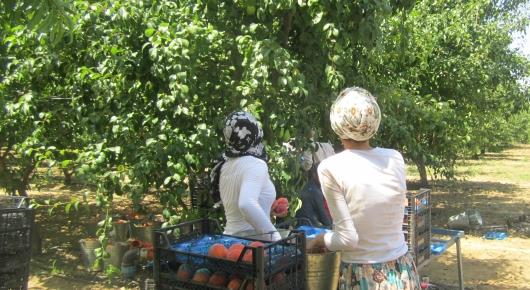Protecting Turkey’s Bursa black figs and Bursa peaches

Turkey is moving closer to having its Bursa black figs and Bursa peaches protected and promoted through geographical indications (GIs) – a move that could raise producers’ incomes and open up market opportunities.
As seen in this new video, the European Bank for Reconstruction and Development (EBRD) and the Food and Agriculture Organization of the United Nations (FAO) have been supporting Bursa’s producers in officially registering the two fruits as GIs.
A GI is a public label that recognizes the link between a high-quality product and its place of origin, protecting that recognition as an intellectual property right. And according to a recent FAO-EBRD study, GI registration brings numerous benefits to producers and rural areas in general.
GI foods are diverse – from French Champagne to Stilton cheese – and can command top prices, catering to a growing market that values quality, tradition, authenticity and reputation.
Having a GI label means that only black figs and peaches from the Bursa region that meet agreed criteria, including production methods and quality and safety standards, can claim the name.
This is welcome news for Haluk Kürel, President of the Barakfakih peach cooperative, who said the Bursa peach is becoming so renowned that peach producers in other areas sometimes use its name and reputation to sell their produce: “We want the GI in order to protect our peach’s name,” he said.
Standing out in a crowded market
The high quality of the fruit stems from specific growing conditions as well as local production and harvesting techniques that have been passed down over generations.
The peel of the plump and sweet Bursa black fig, for example, is thicker than that of figs produced elsewhere, which gives it a longer shelf life.
With the support of FAO and the EBRD, producers of Bursa black figs and Bursa peaches have been working together to finalize codes of practice for their respective products.
Knowing that producers who use the Bursa name must comply with specific rules gives consumers confidence that what they are buying is the real deal, safe and of high quality.
Sustainable and inclusive growth
Strong marketing campaigns around GI products can also preserve the region’s cultural heritage and create jobs, including in tourism.
A group of Turkish producers, researchers, certifiers and government representatives saw this first-hand during a study tour organized by FAO and the EBRD earlier this year to France’s Rhône-Alpes region.
While there, the group learned more about the social and economic benefits that come with promoting and protecting products with geographical indication labels.
“Cooperation among local producers and other industry players is key for a successful GI. And a successful GI can really drive rural development and create more inclusive and sustainable supply chains,” said Victoria Zinchuk, Head of Agribusiness Advisory at the EBRD.
Since the FAO-EBRD project began, producers in Bursa have set up cooperative associations for both black figs and peaches and are developing partnerships with local public authorities and experts from the University of Uludağ in Bursa. They now have their sights set on registering the two geographical indications internationally, which would help producers access European Union markets.
FAO and the EBRD recently published a study detailing the economic benefits of geographical indications. In all nine cases studied, origin-linked registration substantially increased the price of the final product, with an added value of between 20 and 50 percent. Read more about the study here.
07 May 2018, Ankara, Turkey
